
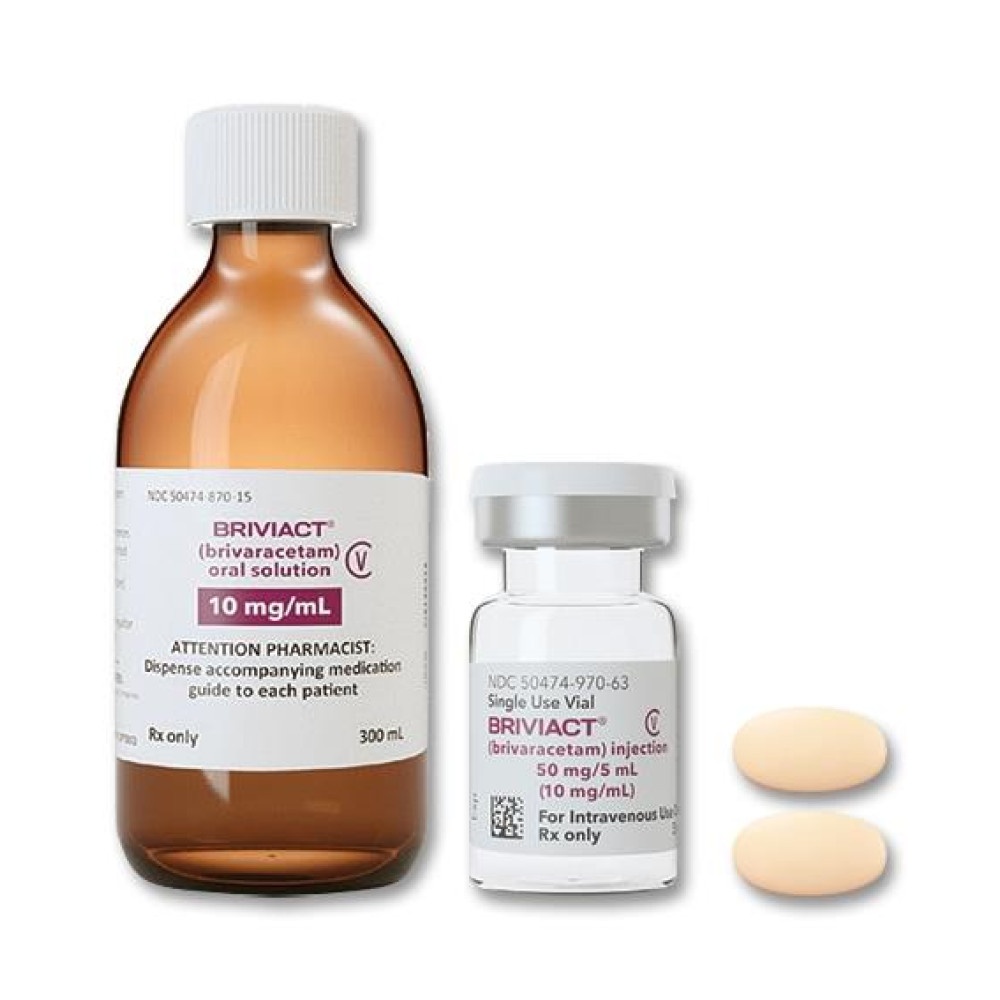
BRIVIACT 10 mg/ml SOLUÇÃO ORAL

Pergunte a um médico sobre a prescrição de BRIVIACT 10 mg/ml SOLUÇÃO ORAL

Como usar BRIVIACT 10 mg/ml SOLUÇÃO ORAL
Introdução
Prospecto: informação para o paciente
Briviact 10 mg/ml solução oral
brivaracetam
Leia todo o prospecto detenidamente antes de começar a tomar este medicamento, porque
contém informações importantes para si.
- Conserva este prospecto, porque pode ter que voltar a lê-lo.
- Se tiver alguma dúvida, consulte o seu médico ou farmacêutico.
- Este medicamento foi prescrito apenas para si, e não deve dá-lo a outras pessoas, mesmo que tenham os mesmos sintomas que si, porque pode prejudicá-las.
- Se experimentar efeitos adversos, consulte o seu médico ou farmacêutico, mesmo que se trate de efeitos adversos que não aparecem neste prospecto. Ver a secção 4.
Conteúdo do prospecto
- O que é Briviact e para que é utilizado
- O que precisa saber antes de começar a tomar Briviact
- Como tomar Briviact
- Posíveis efeitos adversos
- Conservação de Briviact
- Conteúdo do envase e informações adicionais
1. O que é Briviact e para que é utilizado
O que é Briviact
Briviact contém o princípio ativo brivaracetam. Pertence a um grupo de medicamentos denominados “antiepilépticos”. Estes medicamentos são usados para o tratamento da epilepsia.
Para que é utilizado Briviact
- Briviact é utilizado em adultos, adolescentes e crianças maiores de 2 anos.
- É utilizado para o tratamento de um tipo de epilepsia que cursa com crises parciais com ou sem generalização secundária.
- As crises parciais são crises que começam afetando apenas um lado do cérebro. Estas crises parciais podem estender-se a áreas maiores de ambos os lados do cérebro – isto é chamado “generalização secundária”.
- Seu médico prescreveu este medicamento para reduzir o número de crises.
- Briviact é utilizado juntamente com outros medicamentos para o tratamento da epilepsia.
2. O que precisa saber antes de começar a tomar Briviact
Não tome Briviact
- se é alérgico a brivaracetam, a outros compostos químicos semelhantes como levetiracetam ou piracetam ou a algum dos outros componentes deste medicamento (incluídos na secção 6). Se não tem certeza, consulte o seu médico ou farmacêutico antes de tomar Briviact.
Advertências e precauções
Consulte o seu médico ou farmacêutico antes de começar a tomar Briviact:
- Se teve pensamentos de se fazer mal ou suicidar-se. Um pequeno número de pessoas em tratamento com medicamentos antiepilépticos como Briviact tiveram pensamentos de se fazer mal ou suicidar-se. Se tiver algum desses pensamentos, contacte imediatamente o seu médico.
- Se tem problemas hepáticos, pode ser que o seu médico precise ajustar a sua dose.
Crianças
Não se recomenda o uso de Briviact em crianças menores de 2 anos de idade.
Toma de Briviact com outros medicamentos
Informa o seu médico ou farmacêutico se está tomando, tomou recentemente ou pode ter que tomar qualquer outro medicamento.
Em particular, informa o seu médico se está tomando algum dos medicamentos seguintes, porque precisará ajustar a sua dose de Briviact:
- Rifampicina, um medicamento usado para tratar infecções bacterianas.
- Erva de São João (também conhecida como Hypericum perforatum) um medicamento à base de plantas utilizado para tratar a depressão e a ansiedade, assim como outras afecções.
Toma de Briviact com álcool
- Não se recomenda o uso deste medicamento com álcool.
- Se tomar álcool enquanto toma Briviact, os efeitos negativos do álcool podem aumentar.
Gravidez e lactação
As mulheres em idade fértil devem comentar o uso de anticoncepcionais com o médico.
Se está grávida ou em período de lactação, acredita que possa estar grávida ou tem intenção de ficar grávida, consulte o seu médico ou farmacêutico antes de utilizar este medicamento.
Não se recomenda tomar Briviact se está grávida, pois se desconhecem os efeitos de Briviact na gravidez e no feto.
Não se recomenda amamentar o seu bebê enquanto está tomando Briviact, pois Briviact é excretado no leite materno.
Não interrompa o tratamento sem consultar primeiro o seu médico. Interromper o tratamento pode aumentar o número de crises e prejudicar o seu bebê.
Condução e uso de máquinas
- Pode sentir-se sonolento, mareado ou cansado enquanto toma Briviact.
- Estes efeitos são mais comuns no início do tratamento ou após um aumento da dose.
- Não conduza, monte em bicicleta ou utilize qualquer ferramenta ou maquinaria até que verifique como lhe afeta este medicamento.
Briviact solução oral contémparahidroxibenzoato de metilo, sódio, sorbitol e propilenglicol
- Parahidroxibenzoato de metilo (E218): pode causar reações alérgicas (possivelmente retardadas).
- Sódio: este medicamento contém menos de 23 mg de sódio (1 mmol) por mililitro; isto é, essencialmente “isento de sódio”.
- Sorbitol (E420) (um tipo de açúcar): este medicamento contém 168 mg de sorbitol em cada ml. O sorbitol é uma fonte de frutose. Se o seu médico lhe indicou que você (ou seu filho) padece de uma intolerância a certos açúcares, ou se lhe foi diagnosticada intolerância hereditária à frutose (IHF), uma doença genética rara, na qual o paciente não pode decompor a frutose, consulte você (ou seu filho) com o seu médico antes de tomar este medicamento.
- Propilenglicol (E1520): este medicamento contém um máximo de 5,5 mg de propilenglicol em cada mililitro.
3. Como tomar Briviact
Siga exatamente as instruções de administração deste medicamento indicadas pelo seu médico. Em caso de dúvida, consulte novamente o seu médico ou farmacêutico.
Você tomará Briviact juntamente com outros medicamentos para tratar a epilepsia.
Dose
Seu médico calculará a dose diária correta para você. Tome a dose diária em duas doses iguais, uma de manhã e outra à tarde, aproximadamente com 12 horas de diferença.
Adolescentes e crianças que pesem 50 kg ou mais, e adultos
- A dose recomendada está entre 25 mg e 100 mg duas vezes ao dia. Pode ser que o seu médico decida ajustá-la posteriormente para encontrar a melhor dose para você.
Na seguinte tabela, são mostrados apenas exemplos de doses a tomar e qual seringa usar. Seu médico determinará a dose adequada para você e qual seringa utilizar, com base no seu peso.
Dose em ml que deve ser tomada duas vezes ao dia e qual seringa usar: para adolescentes e crianças que pesem 50 kg ou mais, e adultos: | ||||
Peso | Dose em ml (que corresponde a 25mg) | Dose em ml (que corresponde a 50mg) | Dose em ml (que corresponde a 75mg) | Dose em ml (que corresponde a 100mg) |
50 kg ou mais | 2,5 ml | 5 ml | 7,5 ml | 10 ml |
Utilizar a seringa de 5ml (marcas de graduação azuis) | Utilizar a seringa de 10ml (marcas de graduação negras) |
Adolescentes e crianças que pesem de 20 kg a menos de 50 kg
- A dose recomendada está entre 0,5 mg e 2 mg por cada kg de peso corporal duas vezes ao dia. Pode ser que o seu médico decida ajustá-la posteriormente para encontrar a melhor dose para você.
Na seguinte tabela, são mostrados apenas exemplos de doses a tomar e qual seringa usar. Seu médico determinará a dose adequada para você e qual seringa utilizar, com base no seu peso.
Dose em ml que deve ser tomada duas vezes ao dia e qual seringa usar: para adolescentes e crianças que pesem de 20 kg a menos de 50 kg: | ||||
Peso | Dose em ml (que corresponde a 0,5 mg/kg = 0,05 ml/kg) | Dose em ml (que corresponde a 1 mg/kg = 0,1 ml/kg) | Dose em ml (que corresponde a 1,5 mg/kg = 0,15 ml/kg) | Dose em ml (que corresponde a 2 mg/kg = 0,2 ml/kg) |
20 kg | 1 ml | 2 ml | 3 ml | 4 ml |
25 kg | 1,25 ml | 2,5 ml | 3,75 ml | 5 ml |
30 kg | 1,5 ml | 3 ml | 4,5 ml | 6 ml* |
35 kg | 1,75 ml | 3,5 ml | 5,25 ml* | 7 ml* |
40 kg | 2 ml | 4 ml | 6 ml* | 8 ml* |
45 kg | 2,25 ml | 4,5 ml | 6,75 ml* | 9 ml* |
Utilizar a seringa de 5ml (marcas de graduação azuis) | Para volumes entre 0,5 ml e 5 ml, utilizar a seringa oral de 5 ml (marcas de graduação azuis)
|
Crianças que pesem de 10 kg a menos de 20 kg
- A dose recomendada é de 0,5 mg a 2,5 mg por cada kg de peso corporal, duas vezes ao dia. O médico da sua criança pode decidir ajustar a dose para encontrar a melhor dose para a sua criança.
Na seguinte tabela, são mostrados apenas exemplos de doses a tomar e qual seringa usar. Seu médico determinará a dose adequada para você e qual seringa utilizar, com base no seu peso.
Dose em ml que deve ser tomada duas vezes ao dia e qual seringa usar para crianças que pesem de 10 kg a menos de 20 kg: | |||||
Peso | Dose em ml (que corresponde a0,5 mg/kg = 0,05 ml/kg) | Dose em ml (que corresponde a1,25 mg/kg = 0,125 ml/kg) | Dose em ml (que corresponde a1,5 mg/kg = 0,15 ml/kg) | Dose em ml (que corresponde a2 mg/kg = 0,2 ml/kg) | Dose em ml (que corresponde a2,5 mg/kg = 0,25 ml/kg) |
10 kg | 0,5 ml | 1,25 ml | 1,5 ml | 2 ml | 2,5 ml |
12 kg | 0,6 ml | 1,5 ml | 1,8 ml | 2,4 ml | 3,0 ml |
14 kg | 0,7 ml | 1,75 ml | 2,1 ml | 2,8 ml | 3,5 ml |
15 kg | 0,75 ml | 1,9 ml | 2,25 ml | 3 ml | 3,75 ml |
Utilizar a seringa de 5ml (marcas de graduação azuis) |
Pacientes com problemas hepáticos
Se tem problemas de fígado:
- Como adolescente ou criança que pese 50 kg ou mais, ou como adulto, a dose máxima que tomará é de 75 mg duas vezes ao dia.
- Como adolescente ou criança que pese de 20 kg a menos de 50 kg, a dose máxima que tomará é de 1,5 mg por cada kg de peso corporal duas vezes ao dia.
Como criança que pese entre 10 kg e menos de 20 kg, a dose máxima que tomará a sua criança é de 2 mg por cada kg de peso corporal duas vezes ao dia.
Como tomar Briviact solução oral
- Pode tomar Briviact solução oral sozinho ou diluído em água ou sumo imediatamente antes de engolir.
- O medicamento pode ser tomado com ou sem comida.
Instruções para o uso por pacientes ou cuidadores:
A caixa inclui duas seringas orais. Verifique com o seu médico qual deve utilizar.
- Para um volume entre 0,5 ml e 5 ml, deve utilizar a seringa oral de 5 ml (marcas de graduação azuis) que é fornecida na caixa para garantir uma dosagem precisa.
- Para volumes superiores a 5 ml e até 10 ml, deve utilizar a seringa oral de 10 ml (marcas de graduação negras) que é fornecida na caixa para garantir uma dosagem precisa
Seringa oral de 5 ml | Seringa oral de 10 ml |
A seringa oral de 5 ml dispõe de 2 marcas de graduação azuis sobrepostas: a intervalos de 0,25 ml e 0,1 ml. | A seringa oral de 10 ml dispõe de marcas de graduação negras a intervalos de 0,25 ml. |
- Abrir o frasco: aperte a tampa e desenrosque-a no sentido contrário ao das agulhas do relógio (figura 1).
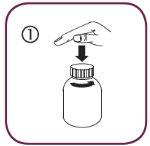
Siga estes passos a primeira vez que tomar Briviact:
- Separe o adaptador da seringa oral (figura 2).
- Insira o adaptador no gargalo do frasco (figura 3). Certifique-se de que está bem fixo. Não precisa remover o adaptador após usá-lo.
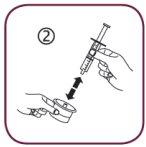
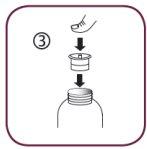
Siga estes passos cada vez que tomar Briviact:
- Coloque a seringa oral na abertura do adaptador (figura 4).
- Ponha o frasco boca abaixo (figura 5).
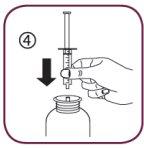
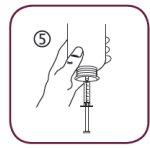
- Sustenha o frasco boca abaixo com uma mão e use a outra para encher a seringa oral.
- Desça o êmbolo para encher a seringa oral com uma pequena quantidade de solução (figura 6).
- Depois, suba o êmbolo para eliminar as possíveis bolhas (figura 7).
- Desça o êmbolo até a marca da dose em mililitros (ml) na seringa oral prescrita pelo seu médico (figura 8).
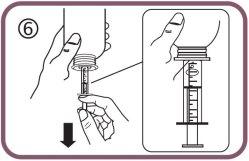
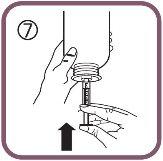
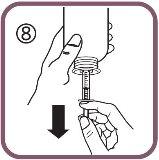
- Ponha o frasco boca acima (figura 9).
- Retire a seringa oral do adaptador (figura 10).
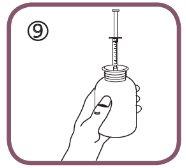
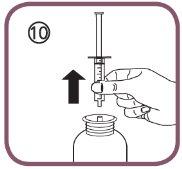
Pode escolher entre duas maneiras de tomar o medicamento:
- esvazie o conteúdo da seringa em água (ou sumo) empurrando o êmbolo até o fundo da seringa oral (figura 11) – então terá que beber todo o líquido (adicione apenas o suficiente para que seja fácil de beber) ou
- beba a solução diretamente da seringa oral sem água – beba todo o conteúdo da seringa (figura 12).
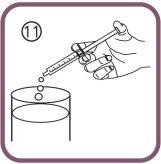
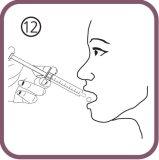
- Feche o frasco com a tampa de rosca de plástico (não é necessário remover o adaptador).
- Para limpar a seringa oral, enxágue-a apenas com água fria, movendo o êmbolo várias vezes para cima e para baixo para recolher e expulsar a água, sem separar os dois componentes da seringa (figura 13).
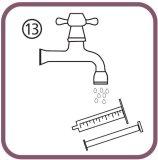
- Guarde o frasco, a seringa oral e o prospecto na caixa.
Duração do tratamento de Briviact
Briviact é um tratamento de longa duração – continue tomando Briviact até que o seu médico lhe indique que pare de tomá-lo.
Se tomar mais Briviact do que deve
Se tomar mais Briviact do que deve, consulte o seu médico. Pode sentir-se mareado e sonolento.
Também pode apresentar algum dos seguintes sintomas: sensação de mal-estar, sensação de “dar voltas”, problemas para manter o equilíbrio, ansiedade, sensação de muito cansaço, irritabilidade, agressividade, dificuldade para dormir, depressão, pensamentos ou tentativas de se fazer mal ou suicidar-se.
Se esquecer de tomar Briviact
- Se esquecer de tomar uma dose, tome-a assim que se lembrar.
- Tome a sua próxima dose à hora a que normalmente a tomaria.
- Não tome uma dose dupla para compensar a dose esquecida.
- Se não tiver certeza do que fazer, consulte o seu médico ou farmacêutico.
Se interromper o tratamento com Briviact
- Não interrompa o tratamento com este medicamento a menos que o seu médico lhe indique que o faça. Isto é porque a interrupção do tratamento pode aumentar o número de crises que você tem.
- Se o seu médico decidir interromper o seu tratamento, ele/ela lhe dará as instruções para a retirada gradual de Briviact. Isto ajudará a evitar a reaparição das suas crises ou que elas piorem.
Se tiver alguma outra dúvida sobre o uso deste medicamento, pergunte ao seu médico ou farmacêutico.
4. Possíveis efeitos adversos
Tal como todos os medicamentos, este medicamento pode produzir efeitos adversos, embora nem todas as pessoas os sofram.
Muito frequentes:podem afetar mais de 1 de cada 10 doentes.
- sensação de sono ou tontura.
Frequentes: podem afetar até 1 de cada 10 doentes.
- gripe
- sentir-se muito cansado (fadiga)
- convulsão, sensação de rotação (vertigem)
- sensação de náuseas e vómitos, prisão de ventre
- depressão, ansiedade, dificuldade para dormir (insónia), irritabilidade
- infecções de nariz e garganta (tais como “resfriado comum”), tosse
- diminuição do apetite
Pouco frequentes: Podem afetar até 1 de cada 100 doentes
- reações alérgicas
- pensamentos anómalos e/ou perda de contacto com a realidade (transtorno psicótico), agressividade, nervosismo (agitação)
- pensamentos ou tentativas de se fazer mal ou suicídio: informe o seu médico imediatamente
- uma diminuição dos glóbulos brancos (chamada ‘neutropenia’) – que aparece nos análises de sangue
Outros efeitos adversos em crianças
Frequentes:podem afetar até 1 de cada 10 doentes.
- inquietude e hiperatividade (hiperatividade psicomotora)
Comunicação de efeitos adversos
Se experimenta qualquer tipo de efeito adverso, consulte o seu médico ou farmacêutico, mesmo que se trate de possíveis efeitos adversos que não aparecem neste folheto. Também pode comunicá-los directamente através do sistema nacional de notificação incluído no Apêndice V. Mediante a comunicação de efeitos adversos, você pode contribuir para proporcionar mais informações sobre a segurança deste medicamento.
5. Conservação de Briviact.
- Mantenha este medicamento fora da vista e do alcance das crianças.
- Não utilize este medicamento após a data de validade que aparece no cartão e no frasco após CAD. A data de validade é o último dia do mês que se indica.
- Este medicamento não requer condições especiais de conservação.
- Após a primeira abertura do frasco, utilize antes de 8 meses.
- Os medicamentos não devem ser jogados pelos desgues ou na lixeira. Pergunte ao seu farmacêutico como se livrar dos envases e dos medicamentos que já não precisa. Desta forma, ajudará a proteger o meio ambiente.
6. Conteúdo do envase e informação adicional
Composição de Briviact
- O princípio ativo é brivaracetam.
- Cada mililitro (ml) contém 10 miligramas (mg) de brivaracetam.
Os outros componentes são: citrato de sódio, ácido cítrico anidro, parahidroxibenzoato de metilo (E218), carmelosa sódica, sucralosa, sorbitol líquido (E420), glicerol (E422), aroma de framboesa (propilenglicol (E1520) 90 % - 98 %), água purificada.
Aspecto do produto e conteúdo do envase
Briviact 10 mg/ml solução oral é um líquido ligeiramente viscoso, transparente, de incolor a amarelado.
O frasco de vidro de 300 ml de Briviact é acondicionado em uma caixa de cartão acompanhado de uma seringa oral de 10 ml (marcas de graduação negras), de uma seringa oral de 5 ml (marcas de graduação azuis) e de adaptadores para as seringas.
Titular da autorização de comercialização e responsável pela fabricação
Titular da autorização de comercialização
UCB Pharma, S.A., Allée de la Recherche 60, B-1070, Bruxelas, Bélgica.
Responsável pela fabricação
UCB Pharma, S.A., Chemin du Foriest, B-1420 Braine-l’Alleud, Bélgica.
Podem solicitar mais informações respeito a este medicamento dirigindo-se ao representante local do titular da autorização de comercialização:
Bélgica UCB Pharma SA/NV Tel: + 32 / (0)2 559 92 00 | Lituânia UCB Pharma Oy Finland Tel: + 358 9 2514 4221 (Finlândia) |
Bulgária ????? ?????????? ???? Te?.: + 359 (0) 2 962 30 49 | Luxemburgo UCB Pharma SA/NV Tél/Tel: + 32 / (0)2 559 92 00 (Bélgica) |
República Checa UCB s.r.o. Tel: + 420 221 773 411 | Hungria UCB Magyarország Kft. Tel.: + 36-(1) 391 0060 |
Dinamarca UCB Nordic A/S Tlf: + 45 / 32 46 24 00 | Malta Pharmasud Ltd. Tel: + 356 / 21 37 64 36 |
Alemanha UCB Pharma GmbH Tel: + 49 /(0) 2173 48 4848 | Países Baixos UCB Pharma B.V. Tel.: + 31 / (0)76-573 11 40 |
Estônia UCB Pharma Oy Finland Tel: + 358 9 2514 4221 (Finlândia) | Noruega UCB Nordic A/S Tlf: + 47 / 67 16 5880 |
Grécia UCB Α.Ε. Τηλ: + 30 / 2109974000 | Áustria UCB Pharma GmbH Tel: + 43-(0)1 291 80 00 |
Espanha UCB Pharma, S.A. Tel: + 34 / 91 570 34 44 | Polônia UCB Pharma Sp. z o.o. / VEDIM Sp. z o.o. Tel: + 48 22 696 99 20 |
França UCB Pharma S.A. Tél: + 33 / (0)1 47 29 44 35 | Portugal UCB Pharma (Produtos Farmacêuticos), Lda Tel: + 351 / 21 302 5300 |
Croácia Medis Adria d.o.o. Tel: +385 (0) 1 230 34 46 | Romênia UCB Pharma Romania S.R.L. Tel: + 40 21 300 29 04 |
Irlanda UCB (Pharma) Ireland Ltd. Tel: + 353 / (0)1-46 37 395 | Eslovênia Medis, d.o.o. Tel: + 386 1 589 69 00 |
Islândia Vistor hf. Simi: + 354 535 7000 | República Eslovaca UCB s.r.o., organizačná zložka Tel: + 421 (0) 2 5920 2020 |
Itália UCB Pharma S.p.A. Tel: + 39 / 02 300 791 | Finlândia UCB Pharma Oy Finland Puh/Tel: + 358 9 2514 4221 |
Chipre Lifepharma (Z.A.M.) Ltd Τηλ: + 357 22 05 63 00 | Suécia UCB Nordic A/S Tel: + 46 / (0) 40 29 49 00 |
Letônia UCB Pharma OY Finland Tel: + 358 9 2514 4221 (Finlândia) | Reino Unido(Irlanda do Norte) UCB (Pharma) Ireland Ltd. Tel: + 353 / (0)1-46 37 395 |
Data da última revisão deste folheto:
Outras fontes de informação
A informação detalhada deste medicamento está disponível na página web da Agência Europeia de Medicamentos: http://www.ema.europa.eu

Quanto custa o BRIVIACT 10 mg/ml SOLUÇÃO ORAL em Espanha em 2025?
O preço médio do BRIVIACT 10 mg/ml SOLUÇÃO ORAL em dezembro de 2025 é de cerca de 119.89 EUR. Os valores podem variar consoante a região, a farmácia e a necessidade de receita. Confirme sempre com uma farmácia local ou fonte online para obter informações atualizadas.
- País de registo
- Preço médio em farmácia119.89 EUR
- Substância ativa
- Requer receita médicaSim
- Fabricante
- Esta informação é apenas para referência e não constitui aconselhamento médico. Consulte sempre um médico antes de tomar qualquer medicamento. A Oladoctor não se responsabiliza por decisões médicas baseadas neste conteúdo.
- Alternativas a BRIVIACT 10 mg/ml SOLUÇÃO ORALForma farmacêutica: COMPRIMIDO, 100 mgSubstância ativa: brivaracetamFabricante: Laboratorios Cinfa S.A.Requer receita médicaForma farmacêutica: COMPRIMIDO, 25 mgSubstância ativa: brivaracetamFabricante: Laboratorios Cinfa S.A.Requer receita médicaForma farmacêutica: COMPRIMIDO, 50 mgSubstância ativa: brivaracetamFabricante: Laboratorios Cinfa S.A.Requer receita médica
Alternativas a BRIVIACT 10 mg/ml SOLUÇÃO ORAL noutros países
As melhores alternativas com o mesmo princípio ativo e efeito terapêutico.
Alternativa a BRIVIACT 10 mg/ml SOLUÇÃO ORAL em Poland
Médicos online para BRIVIACT 10 mg/ml SOLUÇÃO ORAL
Avaliação de posologia, efeitos secundários, interações, contraindicações e renovação da receita de BRIVIACT 10 mg/ml SOLUÇÃO ORAL – sujeita a avaliação médica e regras locais.







